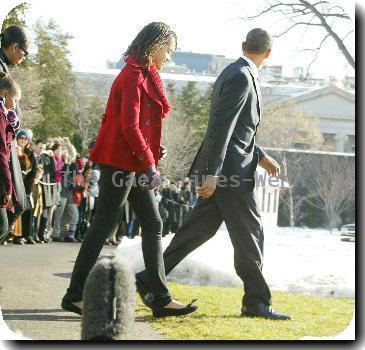Key US security agencies lack permanent leaders as administration focuses on air safety
By Eileen Sullivan, APTuesday, December 29, 2009
Key security agencies lack permanent leaders
WASHINGTON — Two federal agencies charged with keeping potential terrorists off airplanes and out of the country have been without their top leaders for nearly a year.
It took the Obama administration more than eight months to nominate anyone to lead the Transportation Security Administration and the Customs and Border Protection agency.
The attempted Christmas Day terrorist attack on a Detroit-bound airliner has prompted a review of U.S. security policies. The acting heads of those agencies — both created in response to the Sept. 11, 2001, terrorist attacks — will be at the forefront of these discussions.
Bogged down with health care reform, the Senate has yet to set a date to hold hearings for the Customs position. And Sen. Jim DeMint, R-S.C., has placed a hold on the president’s choice to head the TSA over the senator’s concern that the new leader would let TSA screeners join a labor union. This has some Democrats blaming politics for the vacancy.
Former U.S. attorney Alan Bersin is nominated to run CBP, and former FBI agent and police detective Erroll Southers is the president’s pick for TSA. The current acting commissioner at CBP is planning to retire next month.
On Christmas Day, alleged terrorist Umar Farouk Abdulmutallab, a Nigerian who spent time in Yemen, was able to sneak an explosive device aboard his flight from Amsterdam to Detroit, only to be thwarted by the device’s apparent failure to work as designed, and aggressive action by other passengers.
Abdulmutallab was not on the government’s terrorist watch list — though he was on a less sensitive and broader database. He was able to maintain a valid U.S. visa despite warnings about him to U.S. embassy officials in Nigeria from his father. Those facts are prompting a broad review of the government’s terrorist detection efforts.
“The president is looking for answers on this,” Denis McDonough, chief of staff of the White House National Security Council, told reporters Monday in Hawaii, where President Barack Obama is vacationing. McDonough said officials have begun to assemble information related to watch list procedures. As yet, no one has been named to oversee the watch list review, he said.
McDonough defended the current leadership and downplayed the significance of not having the new TSA administrator confirmed, although he said “the president is eager to have his TSA head on the job.”
Acting TSA Administrator Gale Rossides is “very able” and “we have a very able team of career professionals at TSA. We have a very able team in the Department at Homeland Security, generally,” McDonough insisted.
Some Republicans were more critical.
“Running a security agency with a revolving door is a recipe for failure,” said Rep. John Mica, R-Fla.
Michael Chertoff, who headed the Homeland Security Department in the Bush administration, said if the country is going to work on enhancing security, there needs to be permanent people in place at TSA and Customs and Border Protection. “A year is too long a time,” he said.
Abdulmutallab, charged with trying to destroy an aircraft, is being held at the federal prison in Milan, Mich. A court hearing that had been scheduled for Monday to determine whether the government can get DNA from him was postponed until Jan. 8. No reason was given.
U.S. officials had warning signs that Abdulmutallab might be a threat.
The embassy visit in which Abdulmatallab’s father said he was concerned about his son’s radicalization triggered a Nov. 20 State Department cable from Nigeria to all U.S. diplomatic missions and department headquarters in Washington. It was also shared with the interagency National Counter Terrorism Center, said State Department spokesman Ian Kelly.
These concerns landed Abdulmutallab among the about 550,000 names in the Terrorist Identities Datamart Environment database, known as TIDE, which is maintained by the NCTC. Other, smaller lists trigger additional airport screening or other restrictions, but intelligence officials said there wasn’t enough information to move Abdulmutallab into those categories.
The NCTC, which has responsibility if any visas are to be pulled over terrorism concerns, then reviewed the information and found it was “insufficient to determine whether his visa should be revoked,” Kelly said.
According to Yemen’s foreign minister, Abdulmutallab was in Yemen from August until early December. He had received a visa to study Arabic in a school in San’a, the Yemeni capital. Citing immigration authorities, the statement said Abdulmutallab had previously studied at the school, indicating it was not his first trip to Yemen.
Yemen, the ancestral home of Osama bin Laden’s family, has been an al-Qaida haven partly because of a weak central government and rugged terrain, affording al-Qaida fighters numerous places to hide. A Yemen-based group, Al-Qaida in the Arabian Peninsula, has claimed responsibility for Abdulmutallab’s actions.
Associated Press writers Philip Elliott in Honolulu; Lolita Baldor in Washington; Jon Gambrell in Lagos, Nigeria; and Donna Abu-Nasr in Riyadh, Saudi Arabia, contributed to this report.
Tags: Africa, Airliner Attack, Barack Obama, Border Security, Christmas, Embassies, Middle East, National Security, Nigeria, North America, Ny109washington, Terrorism, United States, Washington, West Africa, Yemen











